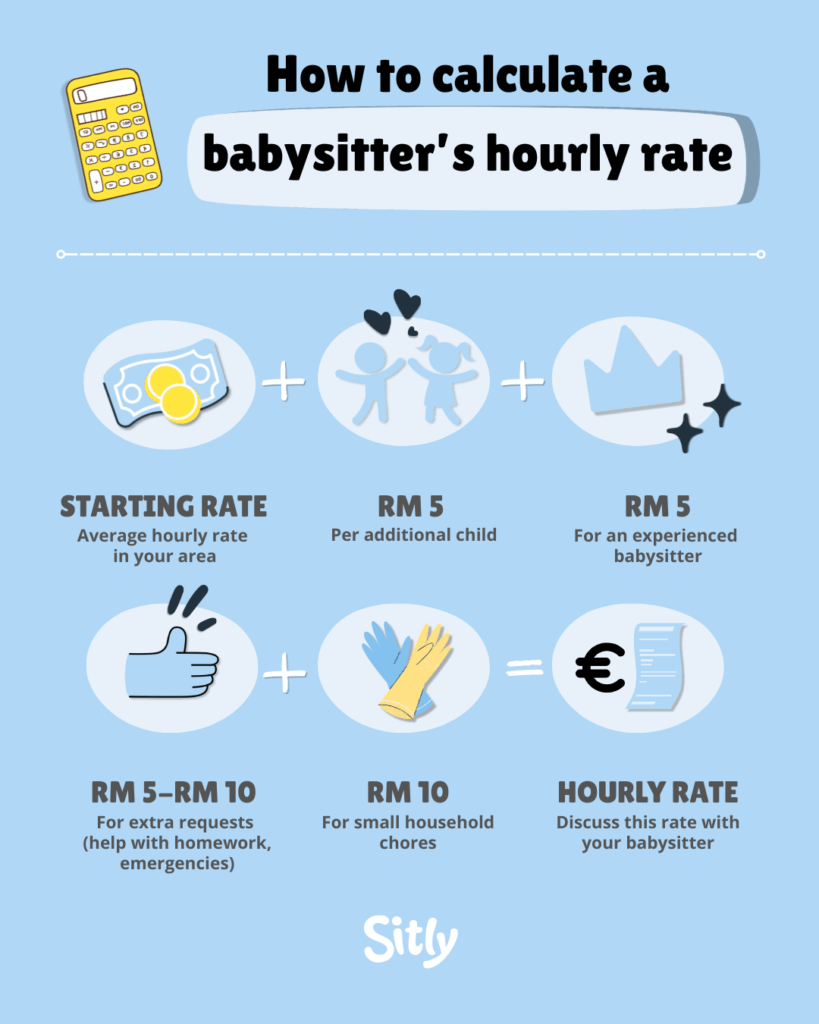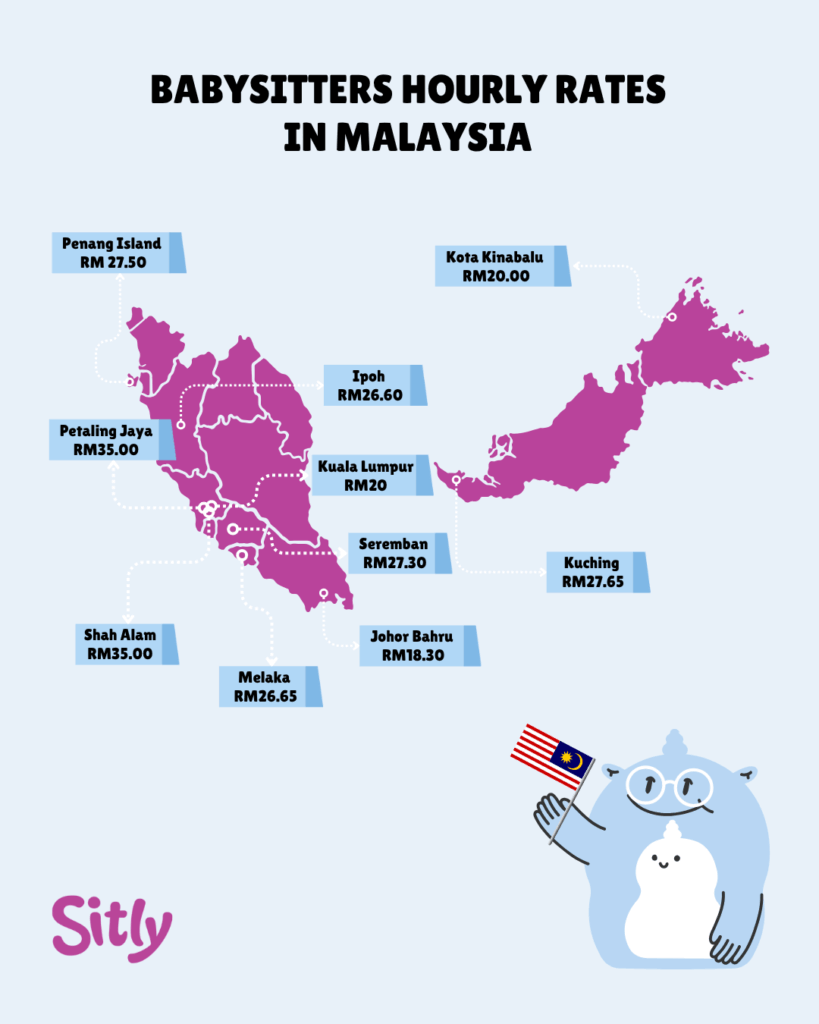How much does a babysitter cost — and what’s a fair hourly rate for babysitting? This in-depth guide explains what parents in Malaysia can expect to pay, whether hiring a teenage sitter for occasional care or a full-time nanny. You’ll find real-life examples, current hourly rates by city, and how responsibilities like cooking, managing multiple children, or overnight care can impact costs. Includes a breakdown of how location, experience, and time of day affect babysitter rates — plus practical tips for discussing pay and setting clear expectations with your sitter.
Wondering how much to pay your babysitter in 2026? Whether you’re hiring a student for weekend evenings or a professional nanny for regular care, rates vary based on age, experience, tasks, and location. This guide breaks it all down — with real-world examples and tips to help you decide on a fair, transparent rate for quality childcare.
In Malaysia, hiring a babysitter can cost anywhere between RM 15 and RM 30 per hour, depending on who you hire and where you live. According to recent data from Sitly, the average hourly rate babysitters expect in urban areas such as Kuala Lumpur and Penang hovers around 27 to RM 35. These figures typically reflect casual, part-time babysitting services often provided by students or young adults in the evenings and at weekends.
However, just like in other countries, babysitting rates in Malaysia vary widely. Factors like the babysitter’s age, experience, certifications, number of children, and your location can significantly influence how much you’ll end up paying.
What Type of Babysitter Are You Hiring?
The kind of childcare provider you choose has a direct impact on the cost:
- Professional nanny: A full-time or part-time nanny with qualifications or fixed hours (sometimes even live-in) can charge RM 25 to RM 35+ per hour, or earn a monthly salary between RM 2,500 and RM 4,500, depending on duties and location.
- Student or part-time babysitter: A university student or 16–18-year-old providing occasional help may ask for a lower rate — typically RM 15 to RM 18 per hour, especially in smaller towns or suburban neighbourhoods.
When setting a fair rate, don’t just think about the time — think about the responsibilities involved. Looking after a baby, managing three siblings, handling bedtime routines, or preparing dinner? These added duties justify a higher hourly rate and should be discussed openly before hiring.
Minimum Wage and Babysitter Rates in Malaysia
In Malaysia, the national minimum wage doesn’t apply to babysitters. Most parents are surprised to learn this, but it’s an important detail if you’re hiring someone to care for your children.
Under current regulations, domestic workers (which include babysitters and nannies hired directly by families) are excluded from the Minimum Wages Order (MWO). That means there’s no fixed legal hourly rate for part-time or full-time babysitting jobs in private homes.
So how are babysitting rates set? Babysitter pay is shaped entirely by the market — in other words, it depends on what families are willing to offer and what sitters expect in return. This is why rates can vary quite a lot across the country.
In the next sections, we’ll look at the main factors that influence how much you should pay, including where you live, the babysitter’s experience, what time of day you need them, the number of children and the babysitter’s tasks. All of these can affect the final rate
Hourly vs. Fixed Babysitting Rate: What’s Common Locally
Most babysitters are paid by the hour, especially when the care is occasional, flexible, or last-minute. It’s the fairest way to match compensation to time and effort.
However, in some situations — like a regular weekly shift or a quiet evening when the kids are already asleep — families and babysitters may agree on a fixed or flat rate instead.
What to Keep in Mind When You Decide on an Hourly or Fixed Babysitting Rate
- Hourly payments are best when schedules vary, duties may change, or you sometimes need help on short notice. You pay for every hour (or partial hour), ensuring your babysitter is fairly compensated — even when plans shift or extra tasks arise.
- Fixed or flat rates work well when the arrangement is predictable: for example, every Saturday night from 6 to 11 p.m., with no extra chores involved. It’s easier to budget and keeps things simple for both parties.
What to Keep in Mind if You Use a Fixed Babysitting Rate
- Always clarify what the fixed rate includes: number of children, whether light housework is expected, if travel or late-night hours are involved, etc.
- Make sure your flat rate doesn’t underpay the babysitter if the workload unexpectedly increases.
- Even with flat rates, many parents choose to add a bonus for extra duties — like staying later, helping with dinner, or managing a more demanding evening than usual.
For example, you might agree with your babysitter on a flat rate of RM 100 for a five-hour evening, especially when the children are already in bed and there are no extra tasks involved. But if she arrives earlier than planned, helps prepare meals, or stays past the agreed time, it’s only fair to add an hourly supplement to reflect the extra work.
How Experience and Qualifications Affect Babysitter Rates
A babysitter’s experience, training, and certifications significantly affect their expected rate and justifiably so. It’s not just about age:
- A 22 -year-old student studying early childhood education, or holding CPR/First Aid certification, will typically charge RM 25–RM 30 per hour, depending on the area and the nature of the job.
- Even a 18-year-old with consistent babysitting experience might ask for more than a basic starting rate, and families often agree — especially if the sitter is reliable, familiar with the children, and trusted to manage things independently.
In general, the more skilled or qualified the babysitter, the higher their expected rate. It’s a Personal Decision. As a parent, you get to decide what feels right for your situation. Are you comfortable hiring someone who’s just getting started — and paying a bit less while they gain experience? Or do you prefer someone with a professional background, and are willing to pay more for added peace of mind? There’s no one-size-fits-all answer — just an agreement that works for both of you.If you’d like a guideline to help calculate fair babysitting wages, check the visual reference below.
Try the Sitly calculator to instantly see babysitter rates in your area. Enter your city, the babysitter’s tasks, and the number of children, and get an immediate average rate.

What Tasks Does Your Babysitter Handle?
The hourly rate for a babysitter doesn’t just depend on their age or experience — it also depends on what you ask them to do during the job. If your babysitter is taking on extra responsibilities, it’s fair to reflect that in their pay.
Taking care of more than one child, managing bedtime routines, or handling special care needs all require more energy and attention. In these cases, a higher hourly rate is absolutely appropriate.
Example: Babysitter (18 years old) – 3 Children + Dinner Prep
Sarah is 18 years old and has extensive babysitting experience. She recently started a teacher training programme and holds a pediatric CPR certification. Once a week, she works for a family with three children aged 8, 5, and 3. She arrives at 1:00 PM, picks up the older children along with the toddler from school, and brings them all home for snacks and playtime. The parents also appreciate it when she prepares dinner, so they can eat together when they return around 6:30 PM. What’s a Fair Rate for Sarah?
Breakdown of her rate:
RM 10.50/hour → Base rate, typical for students in suburban areas
+RM 5.00/hour → For managing two additional children
+RM 3.00/hour → For experience and CPR certification
= RM 18.50/hour
She works for 5.5 hours, so her pay is:
RM 18.50 × 5.5 = RM 101.75
Because Sarah also cooks dinner, the family rounds it up to a flat RM 102.00 — a fair and simple rate for both sides.
Babysitting Babies vs. Older Kids
The age of your children plays a big role in determining a fair babysitting rate. Babysitter rates for infants in Malaysia are usually higher and with good reason. Looking after a baby or toddler is intense, hands-on work. The babysitter needs to be fully engaged the entire time: feeding, changing, comforting, and making sure the child is safe and stimulated. This kind of care requires focus, patience, and often more experience and the hourly rate should reflect that.
With older children, especially those aged six and up, the job is usually a bit lighter. They can eat on their own, use the bathroom without help, and often play or do homework independently. The sitter still needs to supervise, of course, but the overall workload is more manageable — and that can mean a slightly lower rate.
In short: the younger and more dependent the child, the higher the level of responsibility — and pay — should be.
Household Tasks and Light Cleaning
If you’re asking your babysitter to help around the house as well as care for your children, it’s fair to increase their hourly rate. These extra tasks go beyond basic childcare and require time and effort that should be recognised.
Common chores that may justify a higher rate include:
- vacuuming
- preparing dinner
- washing dishes
- loading or unloading the dishwasher
- folding laundry
- watering the plants
These responsibilities are closer to what a domestic helper or cleaner might handle — and considering that a cleaner here can earn around RM 20 to RM 25 per hour, it’s only fair to pay above the base babysitting rate when extra help is involved.
Evening Babysitting vs. Daytime Babysitting
Do you only need help in the evenings, or is your babysitter also covering the after-school routine? The time of day can make a difference in how much you pay — because not all hours are equal when it comes to energy and responsibilities.
Evening babysitting is often paid at a slightly higher rate, especially when the children are already asleep and there’s not much active care involved. If your sitter is mostly there to keep an eye on things and handle a quiet household, the pay can reflect that.This is especially true if you’re booking overnight babysitting, which involves late-night hours, added responsibility, and disrupted sleep. In most cases, the rate should be significantly higher than standard evening care, particularly if the babysitter is staying alert throughout the night or caring for an infant.
Some parents choose to adjust the rate after 8:00 PM, when things usually quiet down, or agree on an average flat rate that balances the busier and calmer parts of the evening.
Example: Babysitter (16 years old) – 2 Children, Weekend Evenings
Lia is a 16-year-old high school student. She has over two years of babysitting experience, mostly gained while looking after her younger brother and cousins. In her current babysitting arrangement, she occasionally cares for two children on weekend evenings. When she arrives at 7:30 PM, the kids are getting ready for bed. She stays until 11:30 PM, and the parents always drive her home. They also provide snacks and drinks, and ask her to wash a few dishes in the sink
What’s a reasonable rate for Lia?
RM 10.00/hour → Suggested rate for a teen babysitter with light duties
+RM 1.00/hour → For supervising a second child
= RM 11.00/hour
However, because the children are already asleep and the evening is very quiet, Lia and the parents agree on a flat rate of RM 10.00/hour.
Total pay: RM 10.00 × 4 hours = RM 40.00
Lia is very happy with the arrangement. It’s a calm evening, she feels trusted, and the rate matches the light responsibilities.
Last-Minute or On-Call Babysitters
Need a babysitter on short notice? That kind of flexibility often comes with a higher price.Spontaneous bookings — especially for morning care or during unexpected situations — may require the babysitter to cancel personal plans or rearrange their day. When that happens, it’s respectful to offer a slightly higher hourly rate. Last-minute availability is convenient for you, but it should be recognised and rewarded fairly.
Example: Babysitter (21 years old) – 1 Child, After-School Care & Lunch Prep
Nina is 21 and currently studying Early Childhood Education. She holds a Child CPR certification and has a flexible class schedule this term. Every Wednesday afternoon, she babysits one child for a regular client. She picks up the 6-year-old boy from school at 12:00 PM, prepares lunch, plays with him, and stays until the parents return around 6:00 PM. The child is very active, so Nina stays engaged the entire time. The family provides all lunch supplies and reimburses small expenses like bus fare or extra snacks.
What’s a reasonable rate for Nina?
RM 17.00/hour → Typical rate for qualified babysitters in urban areas
+RM 1.00/hour → For CPR certification and formal training
+RM 1.00/hour → For high-energy care and full engagement
= RM 19.00/hour
She works for 6 hours, so the total is:
RM 19.00 × 6 = RM 114.00
The family rounds this to RM 115 and always provides lunch — a fair and transparent agreement that works well for both sides.
Talking About Pay With Your Babysitter
Once you’ve decided on a fair hourly rate, the next step is to discuss it openly with your babysitter.
It might feel a little awkward at first — especially if it’s your first time hiring help — but being clear from the beginning helps avoid any misunderstandings later.
A good approach is to ask your babysitter if they already have a rate in mind. Most sitters, especially students and teens, have a general idea of what others in their network earn. If both of you come prepared, with clear expectations and a simple explanation for your proposal, it becomes much easier to agree on a rate that feels fair for both sides.
A respectful conversation sets the tone for a strong relationship — and makes it more likely your babysitter will feel valued, motivated, and happy to keep helping your family over time.
Hourly Babysitting Rates by City in Malaysia
To help you understand what a fair rate might be for your babysitter, here are the average hourly rates reported by Sitly babysitters, based on their public profiles on the platform.
These figures reflect the average rates that babysitters themselves request — not what families necessarily pay — and are a useful reference for setting expectations in your area.

Babysitter rates can vary significantly depending on where you live and these recent figures reflect exactly that. In major urban centres like Kuala Lumpur, Shah Alam, and Petaling Jaya, the average hourly cost reaches RM 35.00, which is at the upper end of the market. This isn’t surprising, given the higher cost of living and the stronger demand for childcare in these areas.
Penang, Melaka, and Kuching show slightly lower averages, ranging between RM 26.50 and RM 27.60, while Ipoh and Seremban remain close behind. These cities tend to have a more balanced supply of babysitters, and while rates are still fair, they reflect slightly less pressure on availability.
At the lower end, Kota Kinabalu stands out with an average of RM 20.00 per hour — noticeably below the national urban average. This may be due to lower living costs or more casual arrangements between families and sitters.
Tip: When in doubt, ask around — other parents in your neighbourhood or school community can be a great resource to help you confirm what’s standard in your city.
Why Location Matters for Babysitter Pay
Babysitting rates can vary significantly by city, province, and even neighbourhood and the main reason is simple: supply and demand.
In areas where there are many babysitters available but fewer families actively hiring, rates tend to be lower, as sitters compete for fewer opportunities.
In contrast, in neighbourhoods where many families are looking for childcare but there aren’t enough babysitters to meet demand, rates naturally increase. This is especially true in urban centres, or in communities with young families and limited after-school care options.
When deciding what to pay, it’s always a good idea to ask around in your local area. Talk to friends, neighbours, or other parents at school or daycare. Knowing what others are paying gives you a realistic benchmark and helps ensure that your offer is fair both for the sitter and for your budget.
Average hourly babysitting rates in Malaysia
| City | Hourly Rate |
|---|---|
| Penang Island | RM27.50 |
| Petaling Jaya | RM35.00 |
| Shah Alam | RM35.00 |
| Melaka | RM26.65 |
| Seremban | RM27.30 |
| Johor Bahru | RM18.30 |
| Kuala Lumpur | RM20.00 |
| Ipoh | RM26.60 |
| Kota Kinabalu | RM20.00 |
| Kuching | RM27.65 |
So, What Should You Pay a Babysitter?
There’s no one-size-fits-all answer when it comes to babysitting rates. The right amount to pay depends on a variety of factors, including:
- The babysitter’s age, experience, and qualifications
- The number and age of your children
- Any additional tasks like cooking or cleaning
- Whether care is needed during the day or at night
- Your location or region
- And, of course, your personal budget
In the end, it’s all about finding the right balance between fair compensation and affordable, trustworthy care for your family. The most important thing is open communication. Talk with your babysitter about expectations, responsibilities, and rate. Together, you can agree on an amount that feels fair for both sides.
Table of contents


FAQS

A babysitter in Malaysia costs between RM12 and RM35 per hour, depending on experience, duties, and location. In major cities like Kuala Lumpur and Penang, rates are usually higher.
The average nanny salary in Malaysia in 2025 ranges from RM1,500 to RM2,500 per month for full-time work. Experienced nannies with childcare training or early education backgrounds can earn up to RM3,000–RM3,500, especially in urban areas.
Domestic helpers in Malaysia typically earn between RM1,200 and RM2,000 per month, depending on nationality, experience, and whether they live in or out. Live-in helpers often receive food and accommodation in addition to salary, while local part-time helpers may charge RM15–RM25 per hour.
Babysitter rates in Kuala Lumpur range from RM15 to RM35 per hour. Prices are higher in central areas like Mont Kiara or Bangsar, and for babysitters with experience, references, or first aid certification. Some professional agencies charge slightly more for vetted caregivers.
A live-in nanny in Malaysia costs between RM2,000 and RM3,000 per month, including food and accommodation. Families hiring foreign domestic workers through an agency may pay additional administrative fees or levies depending on employment regulations.


Trusted sitters, right around the corner
Need a little help? Sitly connects you with experienced babysitters in your area. Whether you need occasional or regular care, finding the right babysitter is super easy. Browse profiles, read reviews, and reach out to your favorites right away.






 Services
Services